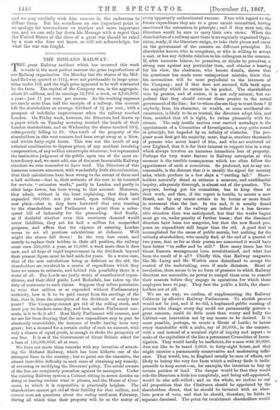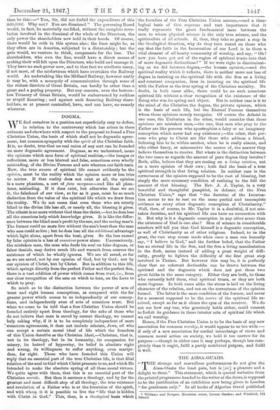THE MIDLAND RAILWAY.
THE great Railway incident which has occurred this week
reveals in the most perfect manner the gross imperfections of our Railway organization. On Monday last the shares of the Mid- land Railway, quoted at 1111, were not purchasable in large quan- tities under 112, and the high price appeared to be well warranted by the facts. The capital of the Company was, in the aggregate, about 25 millions, and its earnings 52,7001. a week, or 2,740,0001. a year—just 11 per cent. per annum. As the working expenses are rarely more than half the receipts of a railway, this account left the shareholders an average dividend of 51. per cent., with a prospect of indefinite improvement when the railway reached London. On Friday week, however, the Directors had drawn up a paper which on Tuesday morning reached the hands of their London shareholders, and on Wednesday the shares touched 104, subsequently falling to 99. One-tenth of the property of the shareholders in this vast concern had been swept away at a blow, and within forty-eight hours. This was not the result of any external combination to depress prices, of any accident involving compensation, of any sudden catastrophe whatever; but represented the instinctive judgment of the public upon one of the most ex- traordinary and, we must add, one of the most lamentable Railway circulars we ever remember to have read. The Directors of this immense concern announce, with wonderfully little circumlocution, that their calculations have been wrong to the extent of three and a half millions—that is, their estimate of the cost to be incurred for certain " extension works," partly in London and partly in other large towns, has been wrong to that amount. Moreover, they admit, without in the least explaining, that they have expended 960,0001. not yet raised, upon rolling stock and new plant—that is, they have borrowed that sum trusting to the shareholders and Parliament to grant them a subse- quent bill of indemnity for the proceeding. And finally, as if doubtful whether even this enormous demand would cover liabilities, they ask for half a million for unspecified purposes, and affirm that the expense of entering London seems to set all previous calculations at defiance. Well might the shares fall down ! In the very best event, and merely to replace their holders in their old position, the railway must earn 550,0001. a year, or 11,0001. a week more than it does now, and all hope of rapid improvement in the dividends beyond their present figure must be laid aside for years. In a worse case, that of the new calculations being as deficient as the old, the shareholders are involved in a course of expenditure which they have no means to estimate, and behind this possibility there is a worst of all. The Lords are justly weary of unauthorized expen- ditures, and their chief guide, Lord Redesdale, has taken up the duty of resistance to such claims. Suppose they refuse permission to raise that million or so expended without Parliamentary authority, how is it to be paid except from the earnings of the line, that is, from the absorption of the dividends of nearly four years ? The Company cannot get rid of the rolling stock, and must pay its bankers some day, and how, unless Parliament con- sents, is it to do it all ? Most likely Parliament will consent, and we are far from denying that the new expenditure may in part be absolutely unavoidable, the increase of traffic having been very great ; but a demand for a certain outlay of such an amount, with only a chance of equal profit, is enough to shake the prosperity of any line. It is as if the Government of Great Britain asked for a loan of 150,000,0001. all at once.
We have not made these remarks with any intention of attack- ing the Midland Railway, which has been hitherto one of the strongest lines in the country ; but to point out the excessive, the almost incredible difficulty in such cases of obtaining any remedy, of reversing or modifying the Directors' policy. The actual owners of the line are completely powerless against its managers. Under the existing Railway system a Cabinet sitting in secret decides on doing or leaving undone what it pleases, and the House of Com- mons, to which it is responsible, is practically helpless. The shareholders cannot get rid of their liability for that million, and cannot even ask questions about the outlay until next February, during all which time their • property will be at the mercy of
every apparently authenticated rumour. Even with regard to the future expenditure they are to a great extent committed, having sanctioned the extensions in principle ; and if they were not, the Directors would be sure to carry their own views. When the shareholders of a railway meet there is no regularly organized Oppo- sition, ready, if the Directors resign, to take their places and carry on the government of the concern on different principles. No shareholder knows who is competent, or who is willing to accept a seat, or has any definite relation to his colleagues in the concern. If, after immense labour, he perceives, or thinks he perceives, a strong case against any particular item, and obtains a hearing for his view, the chairman, who knows details, shows that his questioner has made some unimportant mistake, hints that his accusations will be most prejudicial to the interests of the Company ; and if that does not succeed, falls back upon the majority which he carries in his pocket. The shareholders vcte by proxies, and of course, it is not only natural, but ex- pedient that they should entrust those proxies to the actual government of the line; for to whom else are they to trust them ? If anybody, from his character, or wealth, or some accidental cir- cumstance, is likely to be so trusted, the directors adopt him, and then, satisfied that all is right, he swims pleasantly with the stream. The only hostile motion ever carried nowadays is the appointment of a Committee of Investigation, a step quite sound in principle, but impeded by an infinity of obstacles. The pro- poser must first get his majority, must, that is, convince thousands of persons who never heard of him, and who are scattered all over England, that it is for their interest to support him in a step which always involves an immense immediate loss of property. Perhaps the very worst feature in Railway enterprise at this moment is the terrible consequences which too often follow the appointment of such a committee. So profound, not to say un- reasonable, is the distrust that it is usually the signal for country sales, which produce in a few slays a " rattling fall." Share- holders naturally dread so extreme a measure, and confidential inquiry, adequately thorough, is almost out of the question. The proposer, having got his committee, has to keep them at their work, and then, if the report is hostile, to secure a new Board, not by any means certain to be better or more frank in statement than the last. In the end, it is usually found that the affairs of the railway are indeed in a leas favour- able situation than was anticipated, but that the works begun must go on, under penalty of further losses ; that the dismissed directors have been too sanguine, but that the new Board pro- poses an expenditure still larger than the old. A good deal is accomplished for the cause of public morals, but nothing for the unlucky shareholders, who usually find, at the end of a quarrel of two years, that as far as their purses are concerned it would have been better " to suffer and be still." Row many times has the Great Eastern management been revolutionized, and what has been the result of it all ? Chiefly this, that Railway magnates like Mr. Laing and Mr. Watkin seem disinclined to accept the control of the undertaking, even if made dictators. Short of revolution, there seems to be no form of pressure to which Railway directors are amenable, no power to compel them even to consult their masters before they engage in operations for which those employers have to pay. They fear the public a little, the share- holders not at all.
We see no way, we confess, of supplementing the Railway Cabinets by effective Railway Parliaments. To abolish proxies would not be just, and if we did, a haphazard public meeting of persona who change every day could not permanently govern a great concern, could do little more than worry and bully the Cabinet—an innovation not by any means to be desired. It is more possible, perhaps, to create a House of Lords ; to invest every shareholder with a stake, say of 20,0001., in the concern, with a real instead of a nominal right of inquiry and report ; to make of the capitalists of the line a permanent Committee of Inves- tigation. They would hardly be inefficient, for a man with 20,0001. does not like to be taxed 2,0001. in forty-eight hours, and they might exercise a permanently conservative and moderating influ- ence. They would, too, in England usually be men of affairs, not likely to betray the very few facts which a railway finds it indis- pensable to keep secret—as, for example, the intention to buy up certain patches of land. The danger would be that they would rule the Directors a little too completely, and being self-appointed, would be also self-willed ; and on the whole, we incline to our old proposition that the Chairman should be appointed by the shareholders direct, that he should be invested with an abso- lute power of veto, and that he should, therefore, be liable to separate dismissal. The point for recalcitrant shareholders would then be this:—" You, Sir, did not forbid the expenditure of this 960,0001. Why not? You are dismissed." The governing Board would, in fact, be materially modified, without the complete revo- lution involved in the dismissal of the whole of the Directors, the only power the shareholders now hold in their hands. Of course, there would be evils in this system also ; the lines might be, as they often are in America, subjected to a dictatorship ; but the gain would, we venture to think, compensate for the loss. The shareholders, who own the line, would have a direct means of making their will felt upon the Directors, who build and manage it. They have no such power now, and to that fact we attribute many, if not most, of the misfortunes which have overtaken the Railway world. An undertaking like the Midland Railway, however costly it may be, with a monopoly of communication through some of the richest districts of Great Britain, can hardly be other than a great and a paying property. But any concern, even the bottom- less Treasury of Great Britain, would be embarrassed by reckless or stupid financing ; and against such financing Railway share- holders, as at present controlled, have, and can have, no remedy whatever.







































 Previous page
Previous page